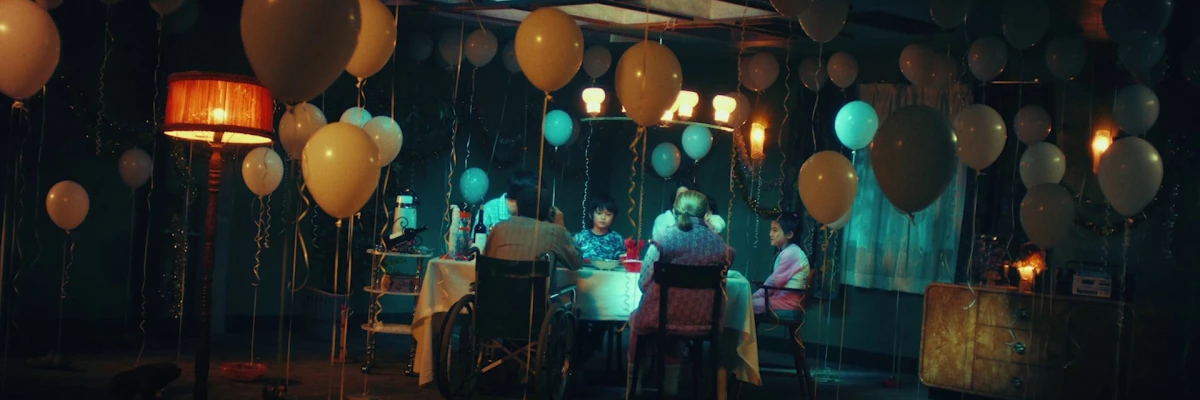Death Days

Makoto Nagahisa made a name for himself directing We Are Little Zombies, but his fame seems rather short-lived. Apparently, he released Death Days [Umare Yuku Hibi] soon after, but that film never got the same amount of hype and exposure, to the point where I'm only finding out about it now, three years after its release. It's not a complete surprise as this is only a mid-length feature, and these aren't too popular. On top of that, the film is also a smidgen less accessible than his runaway hit. But if you ask me, it's the better of the two and it deserves to find an appreciative audience.

We Are Little Zombies felt like a breath of fresh air, a film by a young and original voice that might bring something new to Japanese cinema. Death Days shares many stylistic traits but covers a more serious topic. Between these two films, it's clear that Nagahisa has a strong signature and isn't afraid to alienate part of his audience in favor of artistic vision. It's a lovely quality, and I hope he can manage to keep his projects funded, because a film like Death Days may put future investors on edge. And it has been eerily quiet on the film front after Nagahisa released this film.
The premise is simple but genius. Rather than birthdays, people in Nagahisa's world celebrate deathdays, a custom that has a few grim and conflicting implications. Nagahisa uses this setup to explore familiar themes around death, the meaning of life, and fate. This in itself is quite basic, but the way they are approached gives these topics a novel spin. You have to appreciate the mix of arthouse and genre elements to get the most out of it, which is probably where the film loses most of its potential audience, but it's at that specific intersection where Death Days truly shines.
In an alternative universe, people don't celebrate their birthday, they celebrate their deathday. People are born knowing on which day they're going to die, but they don't know what year. So each year, they spend one day in fear, hoping they'll survive another trip around the sun. A couple decides to get married on the woman's deathday, to make it a more joyful occasion, not realizing that tragedy might strike on this very day. When disaster strikes, the man is forced to sit out his time until his deathday arrives, knowing he can't just kill himself on any other day.
![screencap of Death Days [Umare Yuku Hibi]](/thumbs/img/articles/1200xauto/death-days-2.webp)
Almost all of the film is shot in a single location, but for some directors, that's their cue to get a bit more creative, which is exactly what happened here. The overt use of artificial lighting and colors, the odd camera angles and unique compositions, the mix of different film media, and the pointed editing all add to Nagahisa's visual signature. It's not quite as maximalist as it could've been, I think there was still a tiny bit of stretch, but for a film that is limited to a small, confined set, it looks absolutely stunning. It's not really a critique, it's just a personal pet peeve.
The score is equally eclectic, even including one of Nagahisa's own productions. It's not exactly my type of music, but this is another perfect example of how that isn't necessarily important for a film. What matters is that it gels with the visuals and that both take on part of the responsibility to create a fitting mood. In that sense, the score is excellent and a clear perk for the overall experience. Extra kudos are in order for the sound design, which adds an extra layer of polish and increases the maximalist feel without squandering too much of the budget.
The performances are great too, but with a film that puts a lot of focus on the audiovisual experience, it's only normal that the actors get fewer opportunities to shine. Go Morita and Shizuka Ishibashi are excellent and bring the necessary heart or their characters, but their performance might not be the main thing people remember when they think back on Death Days. Still, their contributions are essential to the emotional depth, and it would be wrong to minimize their efforts. The rest of the cast is decent, but they get noticeably less exposure.
![screencap of Death Days [Umare Yuku Hibi]](/thumbs/img/articles/1200xauto/death-days-3.webp)
With only 60 minutes on the clock, Nagahisa had to limit himself to the bare essentials to get the plot across. He focuses on a handful of crucial deathdays to tell the story of his protagonist, but obviously there are going to be some gaps that the audience has to fill in themselves. I quite liked the setup, but then I'm not the biggest fan of films with a heavy focus on narration, explaining everything to the letter. If you're looking for a tight plot, deep characterizations, and lengthy explorations of core themes, this film won't be for you.
Death Days is one of those films where you'll know whether you'll love or hate it five minutes in. It ticked a lot of boxes for me, and thanks to the short runtime, it felt dense and overwhelming. Nagahisa's visceral and inspired direction is the absolute highlight of the film. The intriguing plot and the strong performances are the icing on the cake. Here's to hoping we'll see more non-serialized work from him soon, as Japan needs people like him to push the medium forward. Getting your hands on this film might be a little tricky, but it's worth the effort.